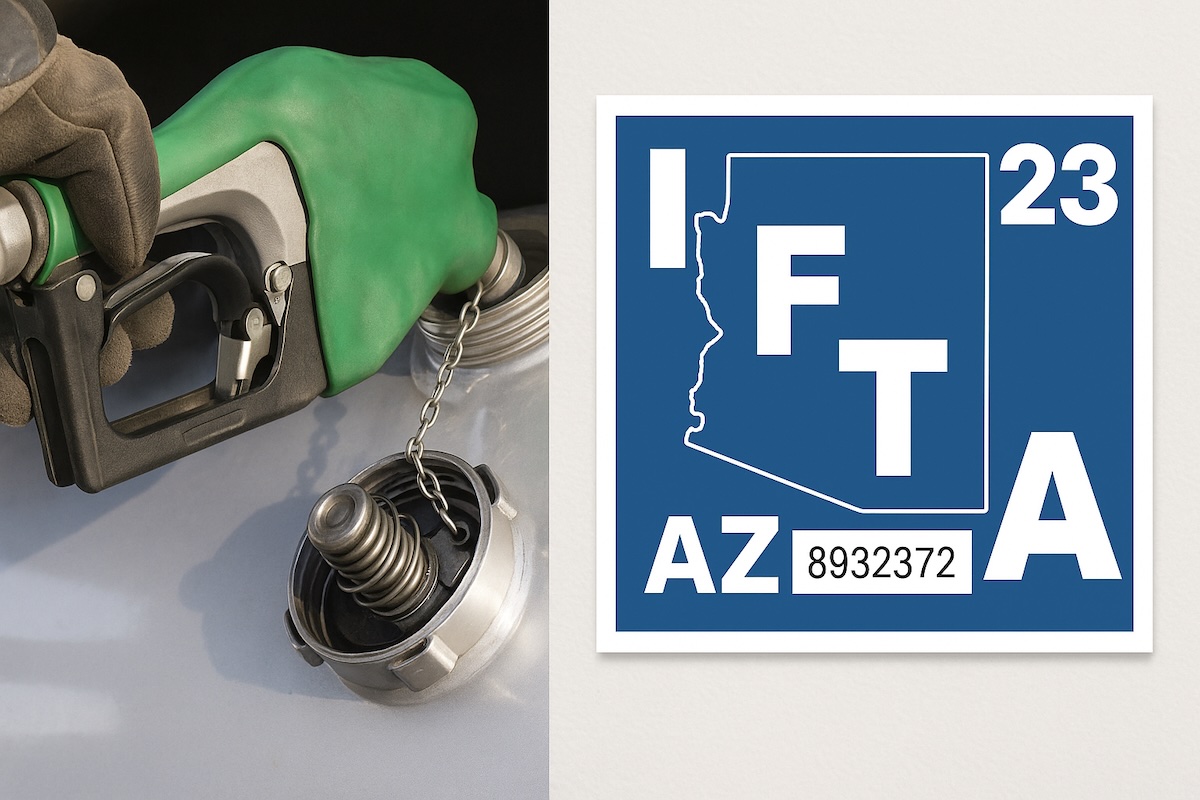IFTA: Who Needs It, Who Qualifies, And What To Do After You Get Apportioned Plates
A clear, accurate guide to the International Fuel Tax Agreement (IFTA) for owners and managers who run trucks across state or provincial lines. Understand who needs this program, how to get licensed, how taxes are calculated, and how to file on time without headaches.

We can license, decal, and file for you, and we will clean up past quarters.
Program essentials
- 48 contiguous states + 10 provinces
- Apply in your base jurisdiction
- File quarterly, even with zero miles
- Two decals per power unit, license copy in cab
- Late penalty: $50 or 10%, whichever is greater
Due dates you can't miss
- Q1 due April 30 (Jan-Mar)
- Q2 due July 31 (Apr-Jun)
- Q3 due October 31 (Jul-Sep)
- Q4 due January 31 (Oct-Dec)
Two different programs
- IRP: Registration fees apportioned by jurisdiction
- IFTA: Motor fuel tax reporting and settlement
- IRP does not include fuel taxes
- Many fleets need both
IFTA Quick Resources for Trucking Companies
Download our comprehensive IFTA resource guide with deadlines, requirements, and checklists your team can use. Includes link to IFTA Tax Matrix.
What the International Fuel Tax Agreement is
The International Fuel Tax Agreement is a cooperative tax program that lets interstate carriers report and pay motor fuel use tax through a single base jurisdiction, which then distributes tax to the states and provinces where you ran. The program is administered by IFTA Inc., a non-profit corporation representing member jurisdictions.
Your base jurisdiction is where your qualified vehicles are registered, where you have some travel, and where operational control and records are kept or can be made available. You apply for your license and renew it through that base jurisdiction. You will receive one license to copy for each qualified vehicle and two decals per qualified vehicle each year.
Learn more: IFTA Inc. and IFTA Carrier Information. For federal oversight, see FMCSA.
Key facts
- 48 contiguous states + 10 provinces
- Apply in your base jurisdiction
- File quarterly, even with zero miles
- Two decals per power unit
- License copy in cab (electronic OK)
- Grace period: Jan 1 to end of Feb for new decals

Do I need IFTA?
You need an International Fuel Tax Agreement license if you are based in a member jurisdiction and you operate a qualified motor vehicle in two or more member jurisdictions. A qualified motor vehicle is used for transporting people or property and meets any one of these conditions per 49 CFR 390.5:
- Two axle power unit with gross vehicle weight or registered gross vehicle weight over 26,000 pounds, or 11,797 kilograms
- Three or more axles on the power unit at any weight
- Used in combination when the combined gross or registered weight is over 26,000 pounds, or 11,797 kilograms
Recreational vehicles that are not used for business are not qualified vehicles per IFTA definitions.
Who does not need the program
- Intrastate only operations
- Two axle trucks at or under 26,000 pounds and not in a qualifying combination
- Recreational vehicles used only for personal use
IRP apportioned plates and IFTA are different
IRP (International Registration Plan) apportions your registration fees across jurisdictions so you can travel without individual trip permits. Registration fees do not include motor fuel taxes or fuel permit fees. IFTA is how you report and settle fuel use tax by jurisdiction. Many fleets need both programs administered by different organizations.
Trip permits instead of IFTA
If you rarely leave your base jurisdiction, you may choose trip permits for those occasional runs instead of licensing for the program. Permitted distance and fuel are included in totals for fuel economy, but not taxed again on the return. Check your state's IRP jurisdiction office for trip permit requirements.
IRP vs IFTA
IRP: Registration fees apportioned by jurisdiction. Allows interstate travel without trip permits.
IFTA: Motor fuel tax reporting and settlement program.
Key point: IRP does not include fuel taxes. Many fleets need both programs.
Filing schedule
- Q1 due April 30 (Jan-Mar)
- Q2 due July 31 (Apr-Jun)
- Q3 due October 31 (Jul-Sep)
- Q4 due January 31 (Oct-Dec)
File even if no miles or fuel purchased.
Penalties and interest
- Late penalty: $50 or 10% of tax due, whichever is greater
- Interest accrues monthly at IRS underpayment rate plus 2%
How the tax is calculated, in plain terms
The return calculates your fleet fuel economy for the quarter. Each jurisdiction's tax rate is applied to the fuel you consumed in that jurisdiction. You get credit for tax paid on fuel purchases. The net is what you owe or the credit you carry forward. Fuel tax rates change, so always check the current quarter's tax matrix.
For detailed calculation methods, see IFTA forms and instructions. State-specific rates are available through your base jurisdiction office.
IFTA audit triggers and red flags
Audits can be random, but certain patterns increase your chances of being selected. Understanding these triggers helps you maintain cleaner records and avoid unnecessary scrutiny.
What triggers an IFTA audit
- Inconsistent fuel economy quarter to quarter without explanation
- Zero or minimal tax due over multiple quarters
- Late filings or missed deadlines
- High out of state fuel purchases in low tax jurisdictions
- Disproportionate mileage versus fuel purchases by jurisdiction
- Random selection
Red flags auditors look for
- Missing or incomplete fuel receipts
- Handwritten logs that do not match ELD or GPS data
- Fuel purchases that exceed tank capacity
- Distance records that do not align with known routes
- Receipts on consecutive days without matching miles
- Wrong unit numbers on receipts
Protection: Document route changes and maintain consistent, complete records.
Recordkeeping checklist
Distance records:
- Trip dates, origin, destination, route
- Beginning and ending odometer or ECM
- Distance by jurisdiction
- Unit number or vehicle ID
Fuel records:
- Date, seller, location
- Gallons or liters, fuel type, price
- Vehicle/unit ID matching distance records
Retention: At least 4 years after return due date
IFTA recordkeeping that passes audit
Keep distance and fuel records that match what you reported. Save them at least four years after the return was due or filed. You can store records in any format that can be audited per IFTA recordkeeping requirements. If you use a vehicle tracking system, it should capture location data at least every ten minutes while the engine is on and preserve odometer readings and unit IDs.
How we help
- License application and renewals through your base jurisdiction
- Quarterly filing with clean, auditable distance and fuel records
- Back quarter cleanup and penalty mitigation support
- Alignment with Driver Qualification Files and IFTA Audit Preparation so your paperwork tells one consistent story
We handle licensing, decals, quarterly tax, and back quarter cleanups. We align the International Fuel Tax Agreement with your IRP and safety files so everything matches.
International Fuel Tax Agreement FAQ
Do I need the program if I run intrastate only
If you never leave your base jurisdiction, you do not need a license. Confirm any local fuel tax rules in your state.
My truck is under 26,000 pounds. Do I need the program
Not if it is a two axle vehicle at or under 26,000 pounds and not operated in a qualifying combination. Three axle power units are qualified at any weight.
I have apportioned plates. Do I still need IFTA
Yes, if you cross jurisdiction lines in a qualified vehicle. IRP is registration only and does not include fuel taxes.
What if I only make one trip out of state this year
You may buy fuel trip permits for that jurisdiction instead of licensing for the program. Keep the receipts and distance records.
When are IFTA returns due
Q1 due April 30, Q2 due July 31, Q3 due October 31, Q4 due January 31. File even with zero activity.
What are the late penalties and interest
Penalty is $50 or 10% of tax due, whichever is greater. Interest accrues monthly at the annual rate set by rule.
What records do I need to keep
Trip dates, origin and destination, route, beginning and ending odometer or ECM, distance by jurisdiction, unit numbers, and complete fuel receipts. Retain at least four years.
Do ELDs cover my required records
ELDs can support mileage but there is no certified ELD for the program. Keep all required supporting data and fuel documentation.
Want this off your plate?
LBC files quarterly returns and keeps your records audit ready. We handle licensing, quarterly returns, and back quarter cleanup.
Resources: IFTA Inc., Current Tax Matrix, Filing guidance, ELD vs IFTA records, FMCSA.
Social promo kit
Graphic prompt: "Commercial tractor fueling at dawn at a modern truck stop, clean branding space on right, bold red and navy palette to match LBC Fleet, clear headline area that reads IFTA Deadlines And Done Right Filing."
Caption and short video idea
LinkedIn: Running across state lines? The IFTA clock never stops. Here's a plain guide and free resource your team can use today.
Instagram Reel: Three shots: 1) Fuel nozzle clicks into tank 2) Calendar flips to April 30 3) On screen text: File IFTA on time. Caption links back to the page.